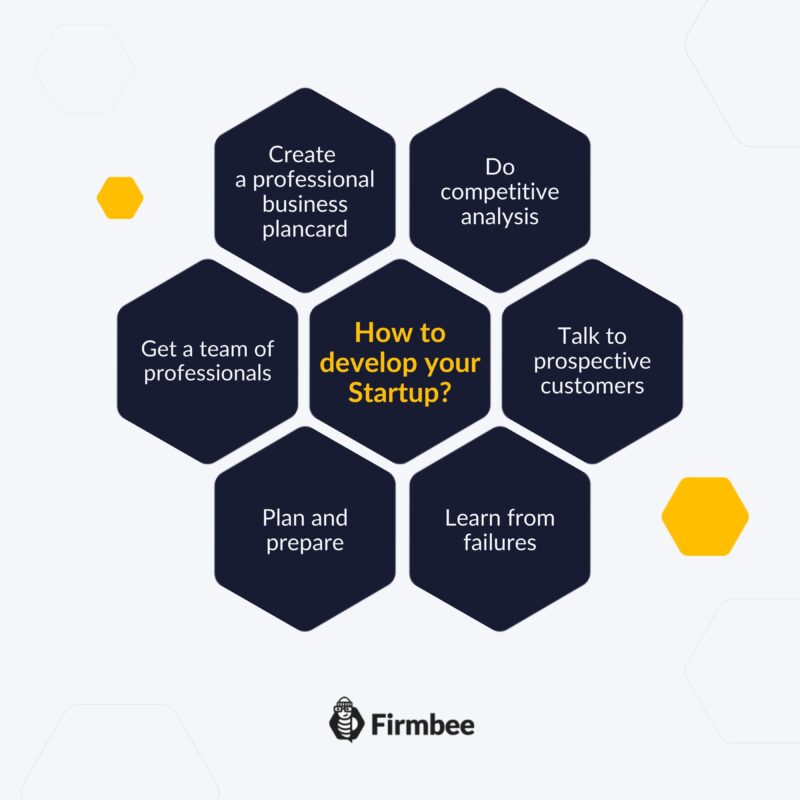A startup is the business of the future. It is oriented on constant and systematic development and based on innovations. There is no place for too much stability and settling down. To break through to the mainstream, there must be a drive for profitable growth. Launching a new product on the market is a noteworthy event, but after that moment a startup should not rest. This is a relatively small step in a potentially multi-year struggle full of ups and downs. In this article, we will answer what startup development is and how to prepare a startup for the future.
Startup development – table of contents:
- Startup development – Looking ahead
- Why doesn’t every startup click?
- Take a while to talk with the recipient
- How do you develop a startup from scratch?
- I have an idea for a startup, what next? Competitive analysis
- Get a team of professionals
- Key questions – Startup development
Startup development – Looking ahead
Like any serious, long-term commitment in life, building a startup requires planning and preparation. It sometimes takes long months, years, or even decades to develop a business idea. At the outset, when there is just a blueprint, one needs great patience, deep focus and utmost caution. After all, Rome wasn’t built in a day.
Many people wonder: I have an idea for a startup — what next? Can’t the idea itself be enough? Why does an idea need to be gradually expanded, and why can’t a once conceived idea be permanent? We explain why this is the case and how to prepare your startup for a bright future.

Why doesn’t every startup click?
The early design stage of your own company consists of a series of untested hypotheses. This is the moment of realization, that an idea that seems nicely sketched on paper can fail in practice. The golden rule suggests that a solution that has worked in the context of another company’s business may not necessarily work every time.
Learning from failures allows you to create a baseline that helps you make smarter decisions in the future. The weakness of startups is their inability to reach their audience. A business idea can become outdated and fail due to lack of market demand. How to counteract this phenomenon and how to find out which is the perfect moment to “enter”?
Take a while to talk with the recipient
Feedback is essential when implementing your own startup. That is why it is so important to systematically contact the audience, i.e., the specific target group of the project.
Simply establishing an endpoint where the product/service will be located may not be sufficient. An important step required for the entrepreneur to take in this pre-launch phase is to take every opportunity to talk to prospective customers.
Even if a startup is in the early design phase, receiving feedback on the venture is extremely helpful. While not all feedbacks are valuable, those distributed by verified recipients can brighten the future of an author’s company.
How do you develop a startup from scratch?
An essential step to developing a startup is creating a professional business plan. This is important, even if the project is small and the risks involved are not high.
Your own business plan means a better chance of getting a bank loan or sponsorship from outside entities convinced by your idea.
A business plan is a document that defines a company’s business strategy for the coming period. It is usually assumed to be valid for 2-3 years. In the business plan, we include information about what we intend to do and what goals we set for our venture. Developing a startup without a document that confirms the assumptions we have made, the goals we have set, or how to accomplish tasks, is beating about the bush.
I have an idea for a startup, what next? Competitive analysis
An idea that seems novel and innovative in theory may have already met with a disappointment in the unspecified past. This is why a competitive market analysis is so important.
Using online sources, directories and legal documents, you should determine if a similar startup existed in your area, city, country. If so, it is useful to dig out why some of them did not succeed and are now closed. The competitive analysis also involves examining the impact of competitors, in terms of threats to the implementation of ideas. Is the risk located in the immediate vicinity, or is the project threatened by unspecified competition, active e.g., on the Internet?
Get a team of professionals
The resources that will be necessary to implement the idea in the later stages of development are a close-knit team of professionals, adequate financial resources, and an extensive network of industry contacts. If a fledgling company lacks any of these elements, the deficiencies must be filled. Human resources can be increased by hiring an expert, financial resources can be expanded by finding a business partner, and contacts can be broadened by taking part in, among others, thematic conferences, webinars, or meetings for start-up entrepreneurs.
Read our other text about startup: Freemium model – 7 tips for startups.
If you want to stay in touch, join our Facebook community!
Author: Andy Nichols
A problem solver with 5 different degrees and endless reserves of motivation. This makes him a perfect Business Owner & Manager. When searching for employees and partners, openness and curiosity of the world are qualities he values the most.
The most important questions
-
How to grow a startup that is a fresh idea?
The first step should be to create a factual business plan that covers the most important issues regarding the company’s goals, aspects of the business, and outlook for the future.
-
Why is competitive analysis important to prepare your startup?
It allows you to find out the activities of your competitors. It also makes it easier to understand why similar startups failed or had to change their business profile.
-
Is contact with the target audience necessary?
Feedbacks, received from recipients of our services/products, provide free knowledge and practice to adapt our goods or services to the changing needs of users.


















